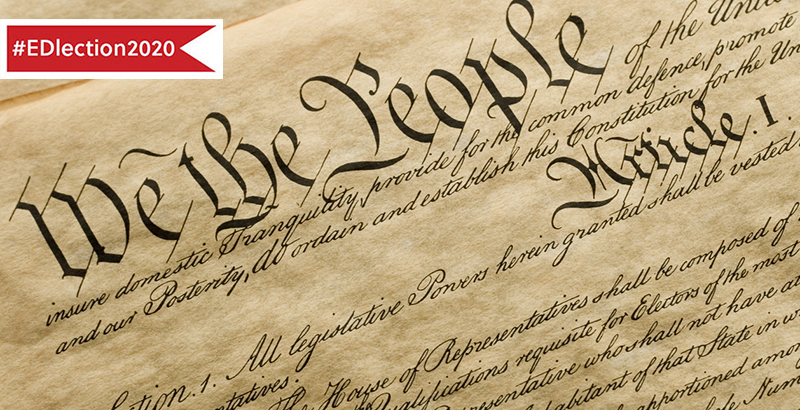Analysis: How States Use Their Constitutional Authority over Education to Push Back Against Trump Assaults on Equity, Accountability

Since his inauguration in January 2017, President Donald Trump has used executive and administrative power to reduce federal oversight of educational equity and accountability. The administration rolled back Obama-era guidance that bolstered the rights of racial minorities, transgender students and people with disabilities. It reduced efforts to gather information about state and local practices affecting these groups and significantly reduced civil rights enforcement. The administration revoked Obama-era rules that encouraged state responsiveness to priorities in the Every Student Succeeds Act. Trump and Secretary of Education Betsy DeVos also pushed the envelope in seeking to make federal aid available to religiously affiliated schools.
These efforts to weaken federal enforcement of student and civil rights, however, encountered resistance from state officials, as my collaborators and I found in a recently published book. Under our federalist system, states have authority over areas not specifically delegated in the Constitution to the U.S. government, and that includes responsibility for funding and delivering public education. With this decentralized education governance, states have passed laws directly opposing Trump initiatives; individuals and organizations have taken legal actions; and many universities, state education agencies and school districts remained committed to Obama-era policies. States confronted the Trump administration even during the first two years of his presidency, when the Republican Party occupied 33 governorships and controlled both legislative chambers in 32 states.
Several states challenged the Trump policy when DeVos confirmed in a February 2017 Dear Colleague letter that the Department of Education was no longer investigating complaints from transgender students barred from school bathrooms that matched their gender identity, several states challenged the Trump policy. The Iowa Department of Education released a statement reiterating the protections for transgender students under state law, and the New Jersey Department of Education issued new guidance on the rights of transgender students. The Colorado legislature passed a bill simplifying the process for transgender individuals to seek a change in gender designation on their birth certificate. A federal judge in North Carolina approved a settlement to resolve litigation on transgender students’ right to access the bathroom of their identity. The settlement was proposed by civil rights groups and the governor.
Further, when the Trump administration sought to undermine the right of transgender athletes to compete against peers in their self-defined gender group, many states pushed back. While seven states placed restrictions that made it difficult for transgender athletes to play high school sports, 17 states allowed transgender athletes to participate based on their declared gender identity.
State court decisions challenged Trump’s agenda even in Republican-controlled states. In South Carolina, Gov. Henry McMaster’s Safe Access to Flexible Education program was designed to use millions of federal dollars for the Coronavirus Aid, Relief and Economic Security (CARES) Act to support about 5,000 students to attend private and religious schools, following DeVos’s lead. While governors in Florida, Oklahoma and several other states are pursuing similar initiatives, the South Carolina ruling illuminates how our decentralized system of government constitutes an institutional check on a president’s agenda.
Some states responded to the weakening of federal support for students with disabilities by bolstering their own protections, following the Education Department’s 2017 decision to revoke Individuals with Disabilities Education Act guidance documents. California, for instance, sought to strengthen anti-discrimination provisions for students with disabilities enrolled in charter schools. Though charter schools under state law must admit any student who applies (or decide admissions based on lottery when they are oversubscribed), reports of disparities in enrollment were prevalent, particularly for students with disabilities receiving poor grades. Gov. Gavin Newsom took actions to crack down on discrimination in charter school enrollment through tightened regulation. The New Hampshire Governor’s Advisory Council on Diversity and Inclusion had repeatedly heard complaints about persistent discrimination in schools without adequate resolution or redress processes. Legislators adopted a bill to prohibit discrimination against students with disabilities as well as age, sex, gender identity, sexual orientation, race, color, marital status, familial status, religion or national origin. Other states had previously approved measures to protect the rights of students with disabilities.
State attorneys general also played a role, suing to delay or block several measures. In an amicus brief filed in the 11th Circuit Court of Appeals, 20 Democratic state attorneys general supported the rights of a Florida transgender student to use the boys’ bathroom at school. Likewise, when the Trump administration stopped processing applications to cancel student loans, primarily from attendees at for-profit colleges, in early 2017, 18 Democratic state attorneys general along with the District of Columbia sued the Department of Education. The federal district court sided with the states, finding the actions of the department to be “arbitrary and capricious” under the Administrative Procedure Act.
In essence, the forces of federalism matters. Like his predecessors, Trump has faced the reality that states and localities shape who gets what, when and how in the education arena. During the Trump presidency, state and local policy actors have maintained institutional checks and balances against attempted unilateral actions on equity and accountability.
Kenneth K. Wong is Walter and Leonore Professor of Education Policy at Brown University. He is a co-author of “Trump, the Administrative Presidency, and Federalism” (Brookings Institution Press, 2020).
Get stories like these delivered straight to your inbox. Sign up for The 74 Newsletter

;)